Yale Information Society Project and Digital Interests Lab event series
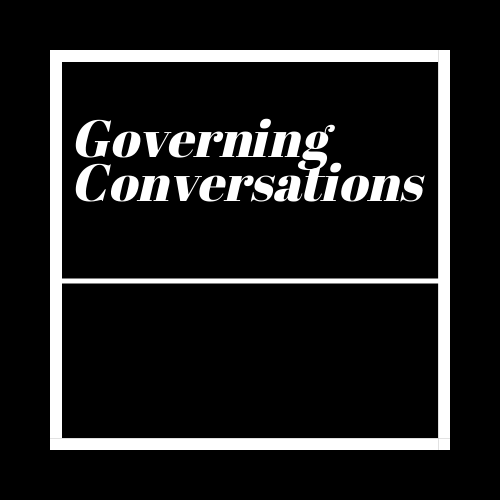
Technology governance issues are now at the forefront of national and global news. Interdisciplinary by nature and with wide-ranging applications, governance scholarship is thus transitioning into a consequential but poorly-defined space.
Co-created by the Digital Interests Lab at NYU, and the Information Society Project at Yale Law School, the Governing Conversations series aims to provide scholars in the field and interested audiences alike a time for genuine reflection and critical perspectives, without the need for a connection to recent events, or academic presentations.
Short of an agenda-setting event, the series sets up three interconnected but distinct themes that can galvanize a better shared understanding of governance research and its role across society.
The series will feature 9 conversations spread out over three themes, each featuring a mix of junior and senior scholars with relevant experience exploring both substantive and professional issues across all three.
Platform Governance, co-sponsored by the UCLA Institute for Technology Law and Policy, kicked off in the Fall of 2021, with events in December 2021, January and February 2022. Access & Accessibility, co-sponsored by the American University’s Internet Governance Lab & Institute on Disability and Public Policy started in the Spring of 2022, with events in April, May and June 2022. Cybersecurity, co-Sponsored by Fundação Getulio Vargas (FGV)’s Center for Technology and Society & CyberBRICS Project took place in Summer 2022 (July, August and September 2022).
Platform Governance
Co-Sponsored by UCLA Institute for Technology Law & Policy
December 2021 – February 2022
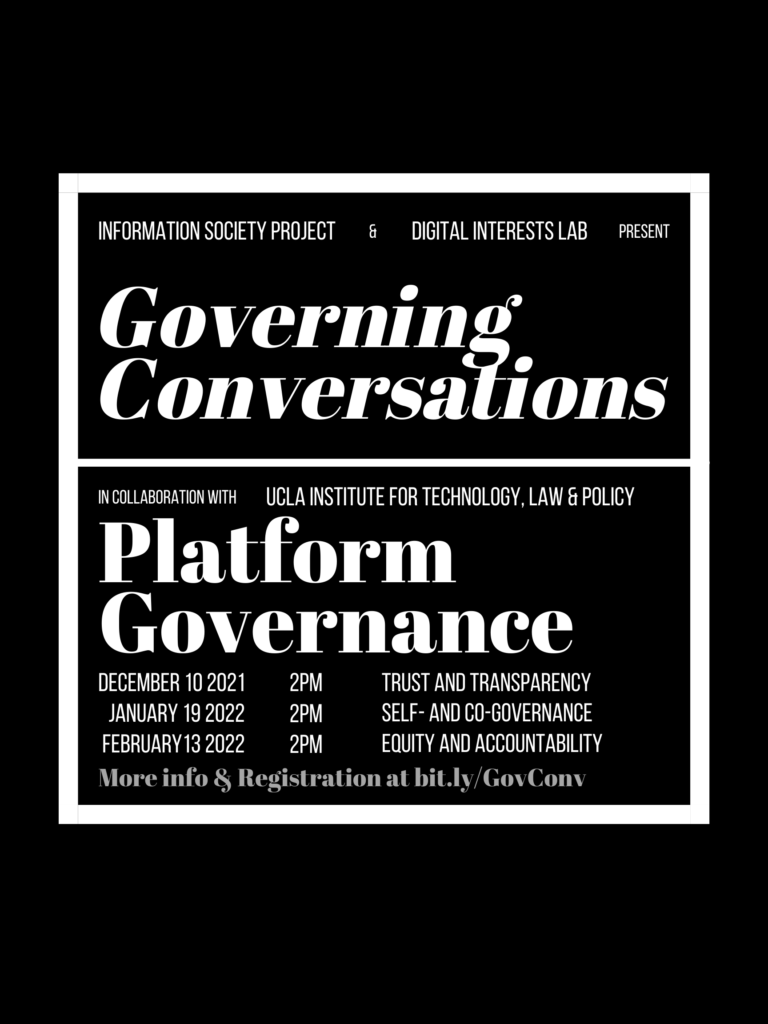
I. Trust and Transparency
December 10th 2021
2PM EST – 3PM EST
Civil society and government stakeholders have very low trust in industry, based on repeated violations of the latter’s own promises. Concurrently, information asymmetry is an initial hurdle to both studying and proposing solutions for platform governance. However, as with everything in this space, the answer is rarely as simple as it may seem at first glance. Transparency, a necessary first step, may end up enabling bad actors, may inadvertently compromise privacy, and ultimately can become a substitute for meaningful policy change. Do systems need to be fully rebuilt in order to restore a sense of balance, or is that balance a red herring? Is the solution policy, tech, both, neither?
Moderator
Jill Bronfman, Adjunct Professor of Law, University of California Hastings
Scholars
Hannah Bloch-Wehba, Associate Professor of Law, Texas A&M University
Neil Richards, Koch Distinguished Professor in Law, Washington University in Saint Louis
Zahra Takhshid, Assistant Professor of Law, University of Denver
Register here.
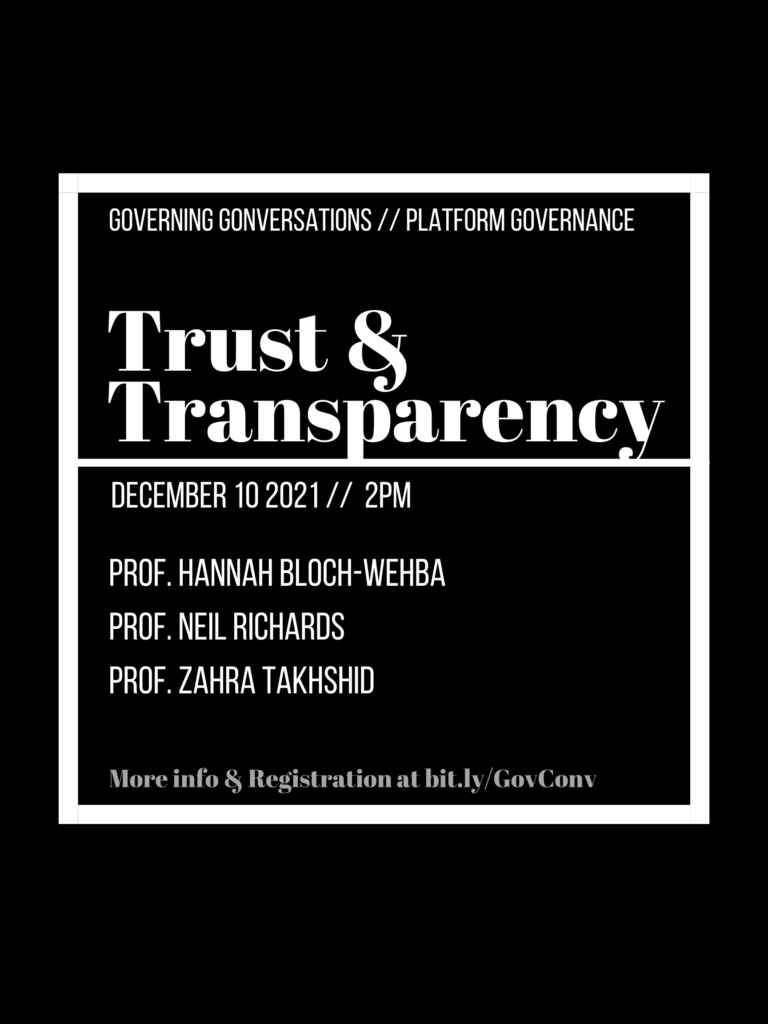
Due to technical errors, there is no recording of this event. A brief recap by DIL student affiliate Zhongqi Teng follows:
Viewing regulations from a global perspective and a transnational effort, panelists generally agreed that current technology companies, especially numerous technology tycoons today, have not yet come close to implementing user-favored regulations. Using milestones such as Brazilian Marco Civil internet regulation, Donald Trump being de-platformed by Twitter, and Twitter being shut down by the Nigerian government, many expressed concerns that platforms were overqualified for their current authorities; moreover, users were not provided enough rights and say in those platforms.
When asked to describe ideal regulations from users’ perspectives, many panelists advocated that platform users should have more power and be one of the primary beneficiaries when new policies were implemented. Prof. Ethan Zuckerman argued that more funds should be going to community-based social networks, and more conversations should be raised so that people can discuss how they would govern themselves, while Jason Pielemeier, deputy director of Global Network Initiative, mentioned that companies need to create more collaborations, take advice from consultors, and build trust with its users.
In the Q&A session, panelists were asked to comment on the future of platform decision-making processes, platform interoperability, and data collection regulations. Many agreed that users need to be more actively engaged in these platforms. Instead of passively waiting for government action and crises, people need to imagine what the future looks like and what areas need regulation reworks.
II. Self- and Co-Governance
January 19th 2022
2PM EST– 3PM EST
An argument can be made that in a legislative environment like the one in the US, the government may not be able to fully tackle the myriad problems that digital platforms bring on, and that the solution should come from a buffet of options. The answer thus is that on some things industry is, or should be responsible for governing itself, while on others all stakeholders should have a say. Is that still a legitimate perspective? Is that the case in other environments where the government is not as restricted?
Moderator
Courtney Radsch, Postdoctoral Fellow, UCLA
Scholars
Bruna Santos, Alexander von Humboldt’s German Chancellor Fellow, Berlin Social Science Center
Nanjala Nyabola, Practitioner Fellow, Stanford PACS
Jason Pielemeier, Deputy Director, Global Network Initiative
Ethan Zuckerman, Associate Professor of Public Policy, University of Massachusetts Amherst.
Register here.
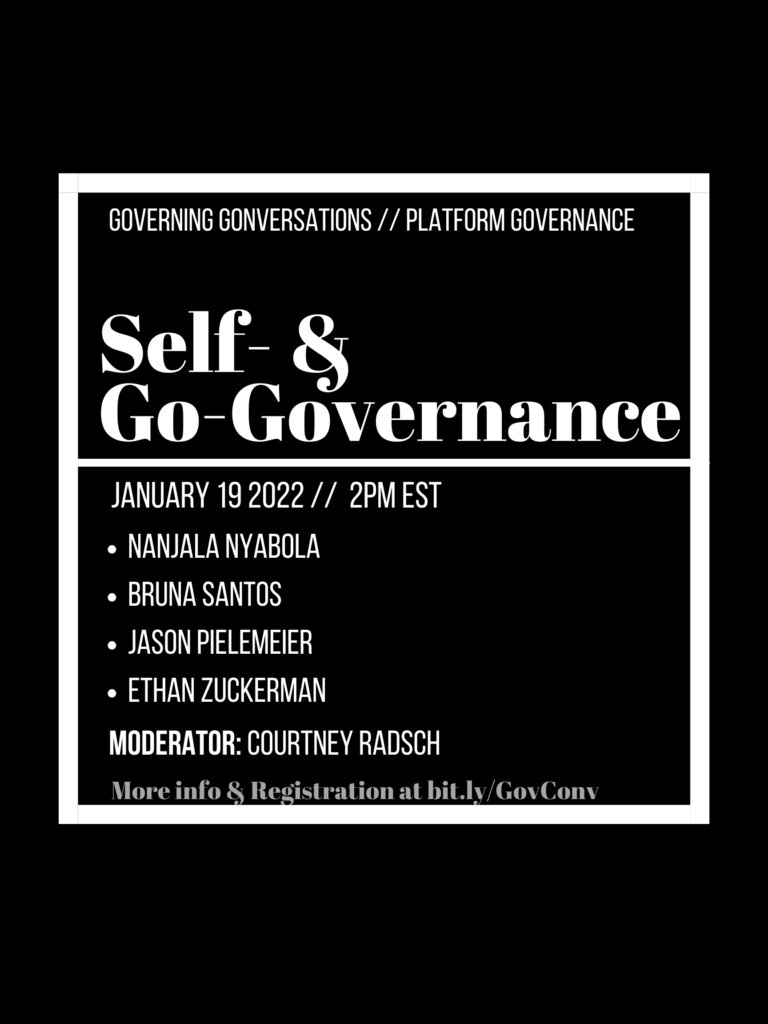
III. Equity and Accountability
February 23rd 2022
2PM EST– 3PM EST
There is a crisis of accountability not just in platform governance in particular, but within platforms in general. Several waves of purported silver bullets, be they through technology, humanity, or ethics, have failed to bring about a true overhaul of the problematic systems in question, offering fleeting small victories instead. How does equity go beyond a performative structure? Can a different way of conceptualizing technology bring about a better environment? Do governance scholars have a responsibility for previous failures?
Moderator
Elettra Bietti, Joint PostDoctoral Fellow, NYU Law and Cornell Tech
Scholars
Ettienne Toussaint, Assistant Professor of Law, University of South Carolina
Estelle Masse, Europe Legislative Manager, Access Now
Achuta Kadambi, Assistant Professor of Engineering, UCLA
Register here.
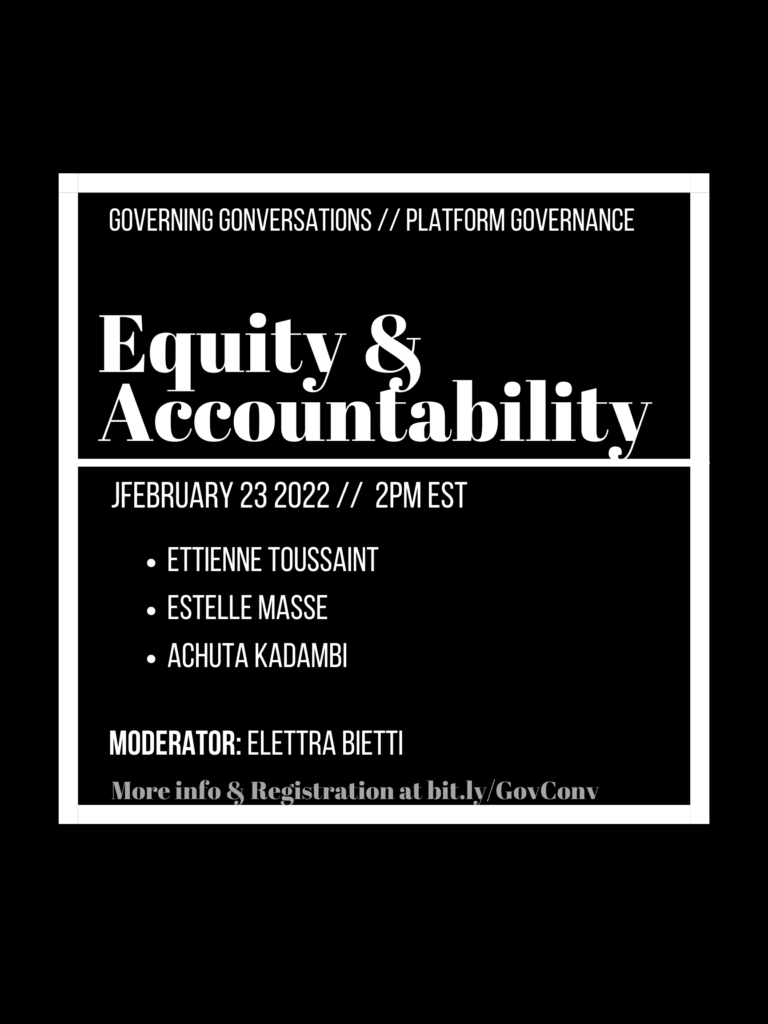
Access & Accessibility
Co-Sponsored by American University’s Internet Governance Lab & Institute on Disability and Public Policy
April 2022 – June 2022
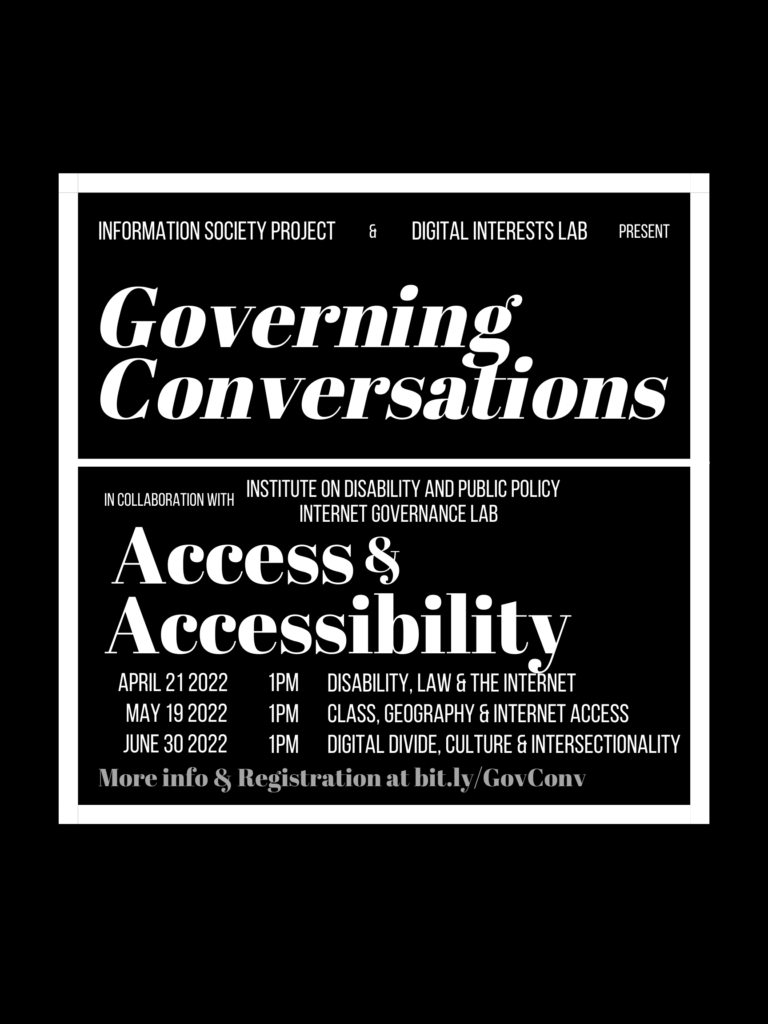
I. Disability, Law & the Internet
April 21st 2022
1PM EST – 2PM EST
Connecting the world through the internet implies the expectation of accessibility, which is essential to the inclusion and empowerment of over one billion people with disabilities worldwide. How that happens relies on different frameworks, with a key moment in implementation, and a focus on the actors in charge. Where does that responsibility lie at the international and national levels? Where should it lie? While focused on the legal aspects of ensuring accessibility on the internet, the conversation around disability can benefit from interventions outside of legal avenues as well. In light of this, our panelists will also discuss the perspective of accommodations in contrast to approaches inspired by universal design principles.
Moderator
Tina Kempin-Reuter , Associate Professor, University of Alabama Birmingham
Scholars
Arlene Mayerson, Herma Hill Kay Lecturer, University of California Berkeley, Law School
Blake Reid, Clinical Professor, University of Colorado Boulder Law School.
Doron Dorfman, Associate Professor of Law, Syracuse University College of Law
Register here!
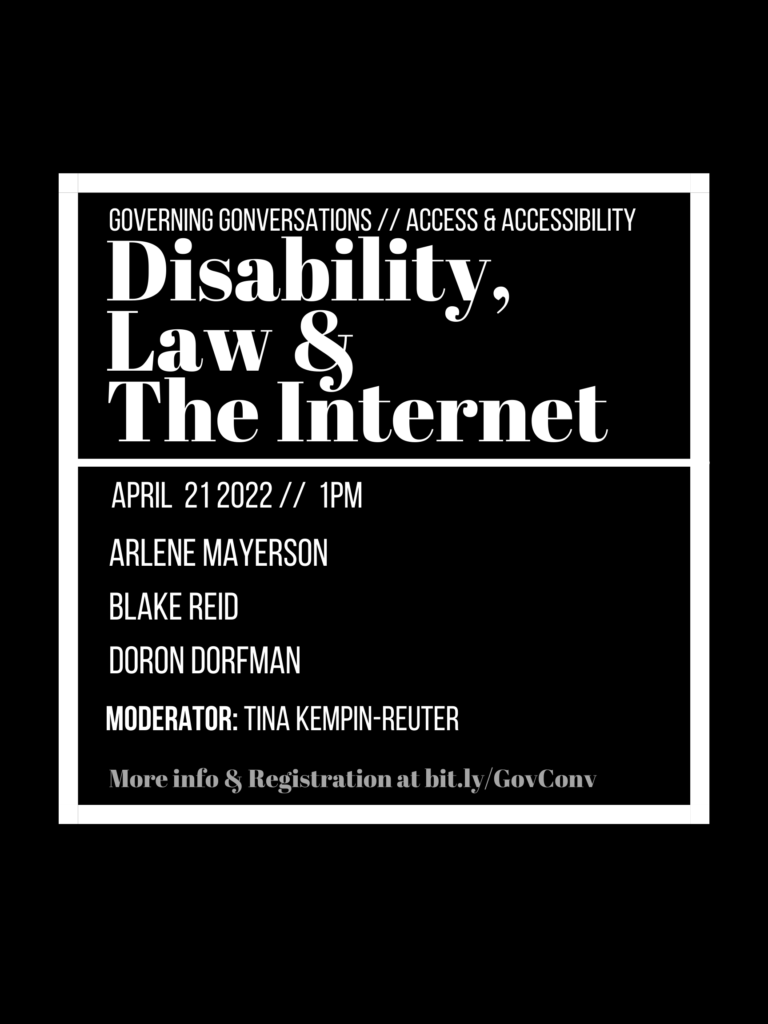
II. Class, Geography & Internet Access
May 19th 2022
1PM EST – 2PM EST
The institutional aspect of access and accessibility is one deeply rooted in the concept of the digital divide, across socio-economic groups, and geographic distribution. Control of the internet, its governing elements, especially through the lens of current events, is a central part of this conversation. How do disadvantaged users get internet access without acceding to the intrusive surveillance practices of certain Internet Service Providers (ISPs) and governments, particularly in non-democratic contexts? Our panelists will discuss whether governance at the institutional level around the world can play a role in breaking the cycle of neglect, while also safeguarding important rights like privacy.
Moderator
Filippo Trevisan , Associate Professor, American University
Scholars
Jenifer Sunrise Winter, Professor, University Hawaii Manoa
Fernanda Rosa, Assistant Professor, Virginia Tech University
Ever Bussey, Digital Equity Lab Research Coordinator, New School
Register here!

III. Digital Divide, Culture & Intersectionality
June 30th 2022
1PM EST – 2PM EST
While ostensibly geared towards governance, the individual and societal levels are key to understanding how the digital divide affects access, accessibility, and (dis-)empowerment. Third level digital divide scholarship broadens our horizon by considering the socio-economic outcomes of different internet uses and non-uses, and tackles tech design as a lynchpin in choices made by disadvantaged users. Our panelists will focus on social groups and the different uses of technology, on the sociological aspects of internet access and use, and on the roles – both positive and negative – that societal structures and culture can play in shaping these experiences and their outcomes.
Moderator
Lydia X.Z. Brown, Policy Counsel, Center for Democracy and Technology
Scholars
André Brock, Associate Professor, Georgia Tech University
Payal Arora, Professor, Erasmus University
Katy Pearce, Associate Professor, University of Washington
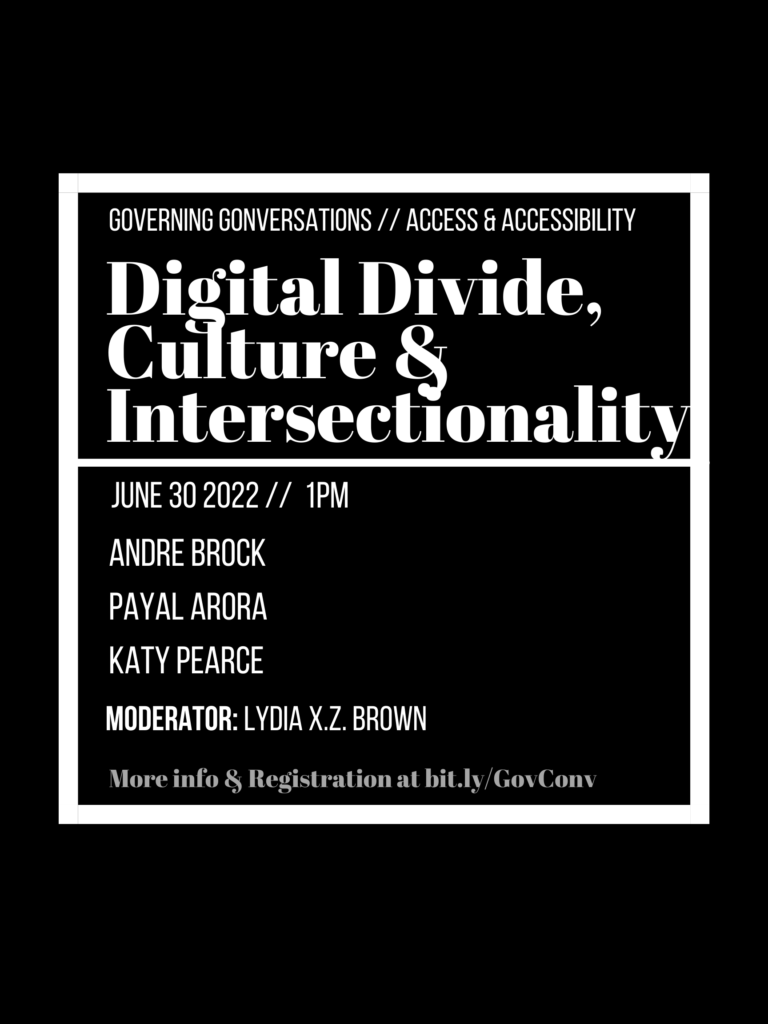
Cybersecurity
Co-Sponsored by Fundação Getulio Vargas (FGV)’s Center for Technology and Society & CyberBRICS Project.
July 2022 – September 2022
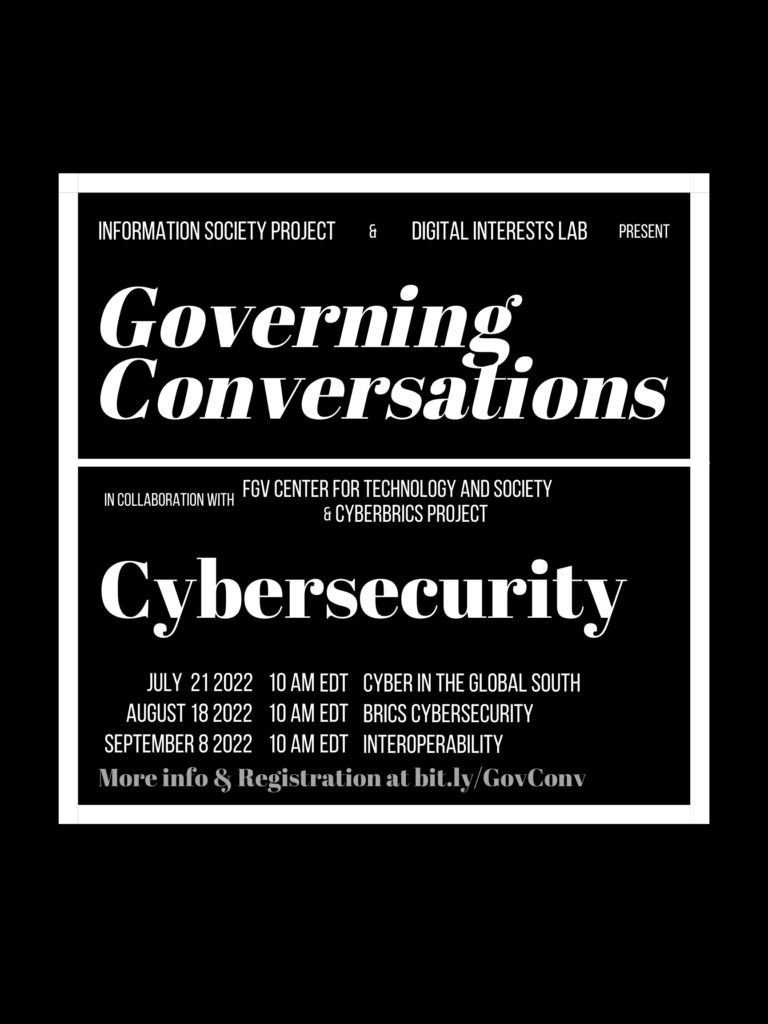
I. Cybersecurity in the Global South
July 21st 2022
10AM EDT – 11AM EDT
There is a need for fostering debate of cyber norms, approaches and tools beyond the Global North narratives. This panel aims to explore the perspective of Global South stakeholders. Cybersecurity is central in international cooperation in the cyber domain, however, to strengthen a coherent and inclusive transnational governance approach in this field, particular attention should be paid on the fast-changing internet geography. Given that most of internet users are now located in the Global South, it is crucial to enhance a dialogue beyond Western-centric perspectives, and empower governments, business, and civil society actors from the Global South to play a key role in this debate. By focusing mainly on low-income and middle-income-country perspectives, this panel will aim at distilling relevant teachings and policy suggestions that may be useful for all stakeholders alike, regardless of their country of origin.
Moderator
Luca Belli, Coordinator, Center for Technology and Society at FGV: Director CyberBRICS
Scholars
Andrea Calderaro, Director, Centre for Internet and Global Politics
Mohamed Chawki, Senior Judge, Council of State of Egypt; Chairman, International Association of Cybercrime Prevention
Vanessa Copetti Cravo, Telecommunications Regulation Specialist & Member, Cybersecurity Technical Group of the Brazilian National Telecommunications Agency – ANATEL

II. BRICS & Cybersecurity
August 18th 2022
10AM EDT – 11AM EDT
A specific and powerful bloc has emerged in the digital governance space and otherwise, the BRICS (Brazil, Russia, India, China and South Africa) countries. Our panelists will discuss the increasing relevance of cybersecurity for the BRICS countries, the recent national policymaking developments occurred in this area at the BRICS level, and the recent calls from BRICS leaders to enhance cooperation on cybersecurity matters. The 2021 BRICS Summit Declaration enshrined the bloc’s five members pledged to pursue enhanced cooperation on cybersecurity issues, including by “establishing legal frameworks of cooperation among BRICS” and exploring the development of a BRICS intergovernmental agreement on cybersecurity. This panel will discuss BRICS cybersecurity concerns, and solutions from the perspectives of the BRICS countries.
Moderator
Sofia Chang, Researcher, CyberBRICS Project
Scholars
Arindrajit Basu, Non-Resident Research Fellow, Centre for Internet and Society, India
Kseniia Ermoshina Researcher, CNRS Centre Internet et Société
Sizwe Snail, Professor, Nelson Mandela University; Former Board Member, Information Regulator of South Africa
Luca Belli, Coordinator, Center for Technology and Society at FGV: Director CyberBRICS
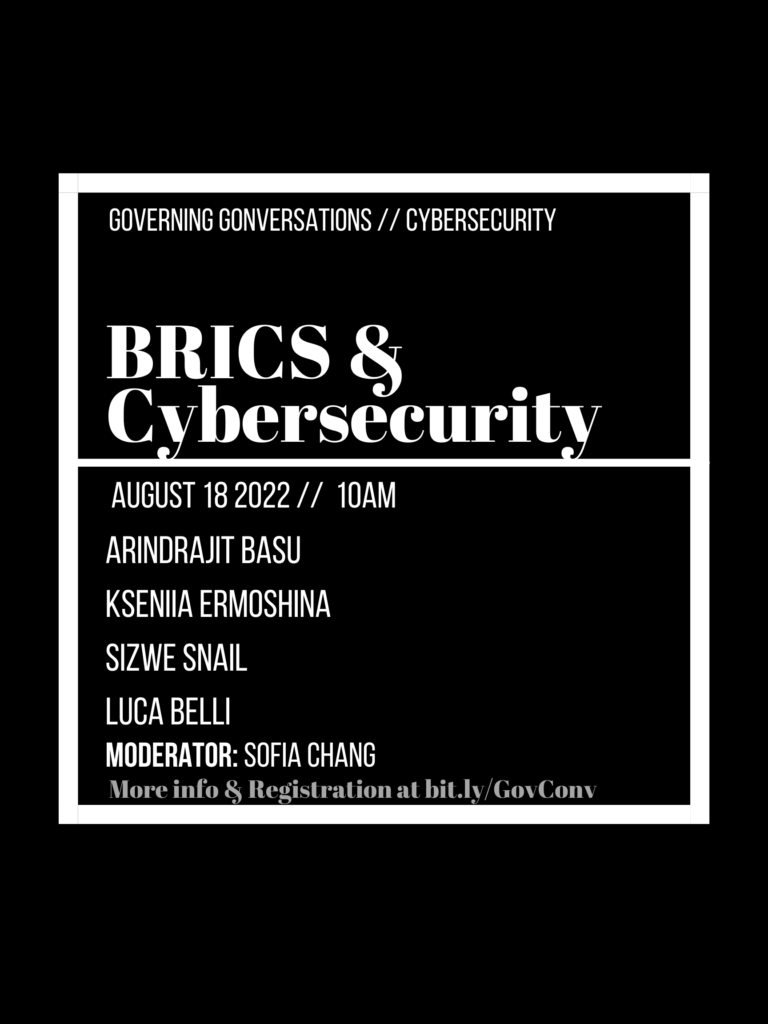
III. Interoperability
September 8th 2022
10AM EDT – 11AM EDT
A solution for a whole range of digital governance concerns, from access to platform regulation, that seems to be increasingly discussed is that of interoperability. A technical solution that requires a proper policy implementation, the concept of interoperability has the potential to both free users from constraints that are not useful to them, and to better protect them from cyber attacks, when applied to tools, models and standards in cybersecurity. Our panelists will discuss policy proposals, technical perspectives as well as more general theoretical ideas about what interoperability can and can’t do, and its inherent limitations.
Moderator
Ian Brown, Visiting professor, CyberBRICS FGV
Scholars
Mehtab Khan, Director, Yale/Wikimedia Initiative on Intermediaries and Information
Sukhi Gulati Internet Policy Research Assistant, MIT Internet Policy Research Institute
Amandine Le Pape, Co-founder, Matrix.org;
